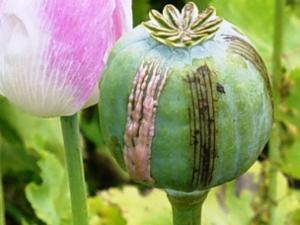Guatemalan President Otto Perez Molina and other government officials said repeatedly this week that they are considering legalizing and regulating opium poppy production in areas where it is already being grown illicitly.

Interior Minister Mauricio Lopez said the government was considering both regulated legal cultivation and alternative development.
"There are two paths, one is cultivated substitutes, and the other is the alternative which is controlled cultivation," Lopez explained. "This is what is already being done in other countries such as India and China, that is to say identifying hectares clearly, seeing how they are grown, carrying out the harvest, taking control of the commercialization and above all making sure this serves mainly the pharmaceutical industry."
Lopez noted that Guatemalan security forces have had 25 years of experience eradicating opium poppies, but that the impact had been "relative."
Guatemalan poppy production is centered in the department of San Marcos, near the Mexican border.
According to the Guatemalan media outlet Prensa Libre, the idea is one of a number of drug reform proposals made to the government by Amanda Fielding of the Beckley Foundation, a British drug reform group that established an office in Guatemala last year.
Perez Molina has been a leading, vocal advocate of reassessing the global drug prohibition framework, especially as it applies to Latin America. But this is the first time his administration has hinted at a concrete "outside the box" proposal, even if only a little outside the box.
This work by StoptheDrugWar.org is licensed under Creative Commons Attribution-ShareAlike 4.0 International
Comments
imagine the degree to which
imagine the degree to which people could have access to medicine all over the world if only opium and marijuana (the latter of which there are many kinds, ie, high cbd, etc) were legal. sure there would be abuse problems, but so what, people should be able to get high too. a lot less people would die from opium than they do from heroin and pharmaceutical opiates, and a plant is drastically cheaper than a pill, so many more people would have access to genuinely needed medicine, and because of the low price, much less crime would be committed in order to buy it and practically none in order to sell it. and the world would be different. the distinction between medicine and recreational use would be less marked (which is both good and bad, but anyway, it's different. there would be a lot more self-medication and less reliance on the pharmaceutical industry). all things considered, the world would be drastically better off. opium and marijuana really are two of the most important medicines in the world. the people should be able to just grow the plants and use them.
I completely agree with
I completely agree with TrebleBass.
Guatemala a guatepeor!
Add new comment